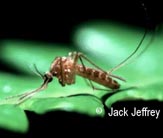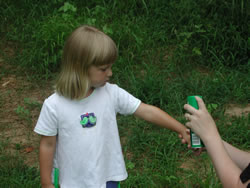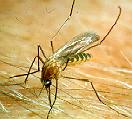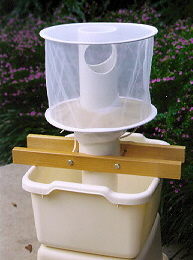THE BEST WEB LINKS FOR WEST NILE VIRUS INFORMATION.
FACTS ABOUT WEST NILE VIRUS
WHAT IS WEST NILE VIRUS?
The West Nile virus is a mosquito-borne flavivirus common in Africa, West Asia and the Middle East. It was first seen in the eastern United States in the summer of 1999. The virus is spread to humans and animals by the bite of an infected mosquito (primarily Culex pipiens, the common house mosquito). Mosquitoes become infected by feeding on birds that carry the virus. The virus is not spread by person-to-person contact such as touching or kissing. There is no evidence that a person can get the virus from touching infected birds, but people should always wear gloves and exercise caution when handling dead animals. Many people who are infected with West Nile virus experience no symptoms. Others may experience mild symptoms, such as low-grade fever, headache and body aches, skin rash or swollen lymph nodes, within three to 15 days. In some people, particularly the elderly, children or people with weak immune systems, the virus can cause encephalitis (inflammation of the brain tissue), which can result in permanent neurological damage and, in rare cases, death. Encephalitis symptoms include the rapid onset of severe headache, high fever, stiff neck, muscle weakness and coma. Some at-risk cities spray pesticides to reduce mosquito populations. In areas where the virus has been found, people should take the following precautions to avoid exposure to mosquitoes:
From April to October, minimize time spent outdoors at dawn, dusk and in the early evening, when mosquitoes are most active.
Wear long-sleeved shirts and long pants when outdoors.
Apply insect repellent sparingly to exposed skin and clothing, according to manufacturer’s directions. Repellent may irritate the eyes and mouth so avoid applying it to the hands of children.
Make sure that doors and windows having tight-fitting screens.
Remove water-holding containers from your property, such as discarded tires, tin cans, ceramic pots and plastic containers to eliminate standing water, which serves as breeding grounds for mosquitoes.
Change the water in bird baths at least once a week.
Drain water from pool covers and keep pools and hot tubs cleaned and chlorinated.
HOW IS IT TRANSMITTED?
The virus is spread to humans and animals by the bite of an infected mosquito (primarily Culex pipiens, the common house mosquito). Mosquitoes become infected by feeding on birds that carry the virus. The virus is not spread by person-to-person contact such as touching or kissing. There is no evidence that a person can get the virus from touching infected birds, but people should always wear gloves and exercise caution when handling dead animals.
WHAT ARE THE SYMPTOMS
Many people who are infected with West Nile virus experience no symptoms. Others may experience mild symptoms, such as low-grade fever, headache and body aches, skin rash or swollen lymph nodes, within three to 15 days. In some people, particularly the elderly, children or people with weak immune systems, the virus can cause encephalitis (inflammation of the brain tissue), which can result in permanent neurological damage and, in rare cases, death. Encephalitis symptoms include the rapid onset of severe headache, high fever, stiff neck, muscle weakness and coma.
WHAT CAN BE DONE TO REDUCE THE RISK OF INFECTION?
Some at-risk cities spray pesticides to reduce mosquito populations. In areas where the virus has been found, people should take the following precautions to avoid exposure to mosquitoes:
From April to October, minimize time spent outdoors at dawn, dusk and in the early evening, when mosquitoes are most active.
Wear long-sleeved shirts and long pants when outdoors.
Apply insect repellent sparingly to exposed skin and clothing, according to manufacturer’s directions. Repellent may irritate the eyes and mouth so avoid applying it to the hands of children.
Make sure that doors and windows having tight-fitting screens.
Remove water-holding containers from your property, such as discarded tires, tin cans, ceramic pots and plastic containers to eliminate standing water, which serves as breeding grounds for mosquitoes.
Change the water in bird baths at least once a week.
Drain water from pool covers and keep pools and hot tubs cleaned and chlorinated.




